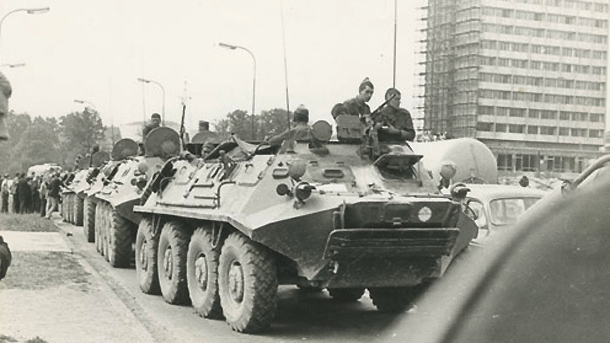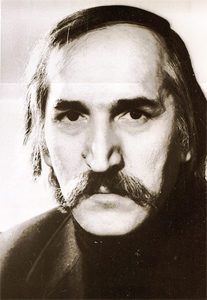 The hot summer of 1968 changed many destinies. The hope of democratic changes and socialism with a human face that came with the PragueSpring were quickly suffocated in the “caring hug” of internationalism over that hot August, when the troops of the Soviet Union and its allies from the Warsaw Pact invaded Czechoslovakia and practically occupied the state. Đoko Rosić used to work for the Bulgarian Radio at that time, as the actor hidden within had yet remained undiscovered:
The hot summer of 1968 changed many destinies. The hope of democratic changes and socialism with a human face that came with the PragueSpring were quickly suffocated in the “caring hug” of internationalism over that hot August, when the troops of the Soviet Union and its allies from the Warsaw Pact invaded Czechoslovakia and practically occupied the state. Đoko Rosić used to work for the Bulgarian Radio at that time, as the actor hidden within had yet remained undiscovered:
“Radio Sofia was an essential part of my life, since I gave my best years to that section, named Foreign Service back then.In 1968, in the autumn after the Czechoslovakia events, called a counterrevolution, a purge took place across the radio – the whole staff was carefully inspected and anyone with “issues” was dismissed. I was a Yugoslavian citizen back then and they had banned the presence of foreign citizens in the radio. At the same time there were quite many Russian citizens with the section, but of course, those faced no problems at all. Being a Yugoslavian, I had to leave."
 The radio purge pushed Đoko Rosić’s life into an unexpected direction. It was the culmination of several months oftension on the silent front with ideology, propaganda and journalism aimed at an attempt to prevent the Bulgarians from the infected /or infectious/ ideas, coming from Czechoslovakia.
The radio purge pushed Đoko Rosić’s life into an unexpected direction. It was the culmination of several months oftension on the silent front with ideology, propaganda and journalism aimed at an attempt to prevent the Bulgarians from the infected /or infectious/ ideas, coming from Czechoslovakia.
Writer Violeta Toncheva recalls evidence of those tense days in her “Book about Radio Varna”. It came from Indra Dimitrova from the Foreign Service of Radio Varna: “I remember mostly the August events in Czechoslovakia, regarding Season 1968. There was tension between those tourists, who demonstrated in the square of Varna against the invasion of the Warsaw Pact’s troops into their country. I was called by my boss on an August morning and he presented me to some person, who would monitor my translations and the reading behind the microphone from then on. A scary period followed… I listened to the broadcasts of the already dissident Radio Prague and the comparison of information made me feel nothing but shame…”
Several radio employees were touched by the iron fist of the party. Marko Stoichev, one of the Mormarev Brothers (prominent Bulgarian film makers in the past) lost his job – editor-in-chief of the entertainment section. His colleagues Konstantin Kostov, Vassil Stanilov, Georgi Ivchev were fired too, followed by Đoko Rosić:
“Rad Kamenski was the CEO back then. He called me in his office and said: 'Đoko, you know that we all love you, don’t you'. I said: 'I know, because I also love everyone a lot'. That was true. That was the romantic period of the radio and we did love one other. 'Well, the time has come when I can’t defend you, he went on to say. Of course, I knew about the ongoing purge. Rad Kamenski gave me a blank sheet of paper and said: 'Đoko, sign right here. You can trust me – I will write on top that your dismissal is under paragraph L'. I still don’t know what that L meant. However, he was a good, decent man and I signed…"
History knows Bulgaria as the first country that insisted on the sending of troops to Czechoslovakia and the last one which apologized. That was made with a decision of the parliament in 1990 and later on in 1997 President Petar Stoyanov apologized personally during his visit to Prague.
Kicked off from the radio, Đoko Rosić became one of the most popular and loved Bulgarian actors, with more than 110 roles in theatre and in cinema.
English version: Zhivko Stanchev
“Our task is to turn Bulgaria into a normal country, not a perfect one. Each human being finds it much more natural to live in a world, where the state doesn’t choke him by the throat, doesn’t determine his views or..
Beautiful, smart, talented and a bit exotic, Elisaveta Bagryana is the brightest star on the Bulgarian cultural horizon, one of very few women. Sensitive and frail, she nevertheless proved incredibly resilient in asserting her name,..
The beginning of the 1990’s was a time of faith, hope and love. However, there was a lack of wisdom, Petko Kovachev, who was back then a member of the Independent Students’ Association and Ecoglastnost, said. 1990 was marked by a series of significant..

+359 2 9336 661
